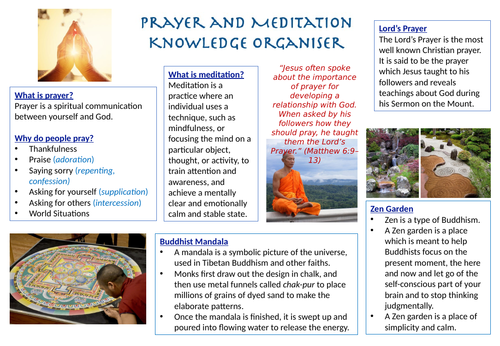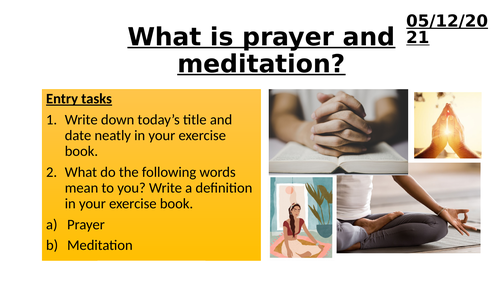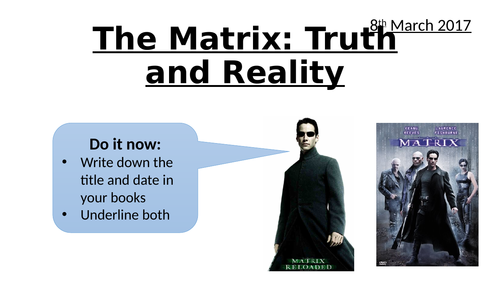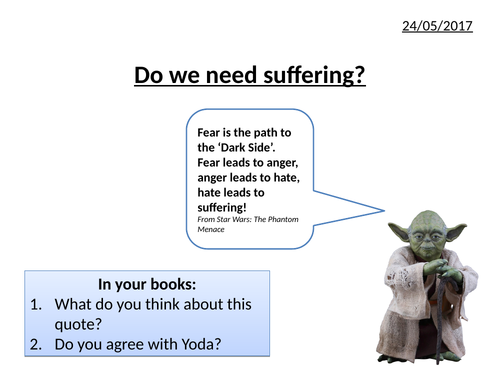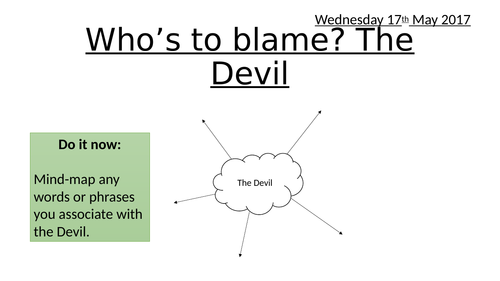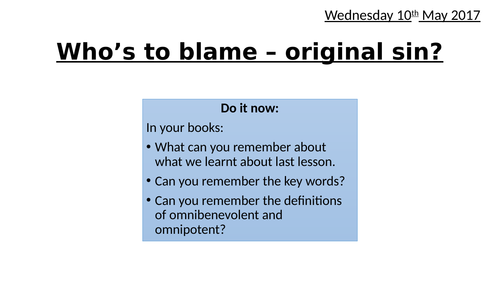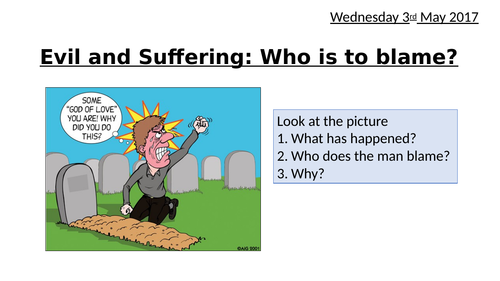338Uploads
115k+Views
41k+Downloads
Philosophy and ethics

Prayer and Meditation Knowledge Organiser
Knowledge Organiser for teaching Prayer and Meditation at KS3.
This colourful knowledge organiser covers:
What is prayer?
What is meditation?
The Lord’s Prayer
Buddhist Mandala’s
Zen Gardens
All on one A4 page! Perfect for revision.
Please review if you purchase, feedback is welcome.

Introduction to Prayer and Meditation
Suitable for teaching KS2 or KS3.
What is prayer and meditation?
This lesson looks at:
What is prayer?
Why do people pray?
What is meditation?
Looking at aids to prayer and meditation in different religions.
Lesson objectives:
Grade 8-9: Analyse why different people pray and meditate and correctly identify aids to prayer for different religions.
Grade 5-7: Consider why people pray and meditate, and describe the aids used by different religions.
Grade 3-4: Identify aids to prayer and know what religion they are used in.
Feedback is welcome, please review if you purchase!

Buddhist Zen Gardens
Whole lesson for teaching KS2 or KS3 Buddhist Zen Gardens.
How does a zen garden express Buddhist beliefs?
This lesson looks at:
What is Zen Buddhism?
What are the Four Noble Truths?
What is a Zen Garden
What is in a Zen Garden - this looks at all the different parts of a Zen Garden, with pictures and descriptions explaining each part (such as sand, stones, water, bridges, trees and plants etc).
Students will then design their own Zen Garden.
Objectives for the lesson:
Grade 8-9: Explain the importance of Zen gardens to Buddhists.
Grade 5-7: Consider why Buddhists use Zen gardens.
Grade 3-4: Identify and describe a Buddhist Zen garden.
ALL: Design your own Zen garden and explain the different features in your Zen garden.
Feedback is welcome, please review if you purchase!

Introduction to World Religions
Suitable for KS3 - An Introduction to World Religions
This lesson looks at;
What is Philosophy and Ethics
What are the main religions (match the symbol to the religion)
How old are the main religions?
What percentage of the world follow each religion?
Perfect as an introductory lesson. Includes a pie chart and graph for some maths curricula links!
Feedback is welcome, please check out my other Philosophy lessons and resources.

Genocide in the 20th Century
Suitable for teaching KS3 - ideally Y9 due to the content of the lesson;
"Does genocide exist today?"
Students will look at examples of genocide in the 20th century;
Holodomor, Ukraine
Cambodia
Bosnia and Herzegovina
Rwanda
Armenia
Using information sheets (provided) students will complete a table (differentiated) on the different genocides. Students will then be asked to reflect on what they have learnt;
Who is responsible for genocide?
Are other people responsible if they do not try to stop the genocide?
Why do people treat other human beings in ways like these?
What would you do if you were in a situation where a group was being targeted?
What can we do to stop genocide from happening in the future?
This can open up some fantastic and thoughtful discussions.
I use this lesson after teaching the Holocaust, as often I find other genocides tend to be forgotten about in the curriculum.
All resources needed are included - please consider teaching this important lesson! Feedback is welcome.

The Matrix: Truth vs Reality
This fun lesson looks at the Matrix: Truth vs Reality and starts with Plato’s Cave. Using video clips, students complete differentiated tasks.
Suitable for 11-14 Philosophy and Ethics/ Religious Studies.
Please review if you purchase.
Bundle

Evil and Suffering Scheme of Work
SAVE 25%!!!
Whole Scheme of Work for teaching the unit Evil and Suffering for Religious Studies/Philosophy and Ethics.
All 5 lessons include differentiated resources, activities, and everything you need to teach it straight away.
Starts off with looking into the idea of evil and suffering with Pandora’s box, the following lessons explore the idea of who is to blame - the Devil, us, and do we need suffering?
Pandora’s Box
Who is to blame
Original Sin
The Devil
Do we need suffering?
Please review if you purchase.

Do we need suffering?
Whole lesson, plus differentiated activities and resources for a lesson on do we need suffering?
Suitable for 11-14 Religious Education or Philosophy.

Who is to blame? - The Devil
Whole lesson looking at who is to blame for evil and suffering - the Devil.
Whole lesson plus resources and activities.
Can be used for 11-14 Philosophy or Religious Education.

Evil and suffering - original sin
Who is to blame for evil and suffering? This lesson explores original sin. Whole lesson plus resources and differentiated activities included.

Who is to blame for evil and suffering?
Full lesson plus activities and for teaching who is to blame for evil and suffering. Suitable for 11-16 Philosophy and Ethics or Religious Studies.

Pandora's Box
Whole lesson plus differentiated activities and links to videos. For teaching 11-16 Philosophy or Religious Education.

